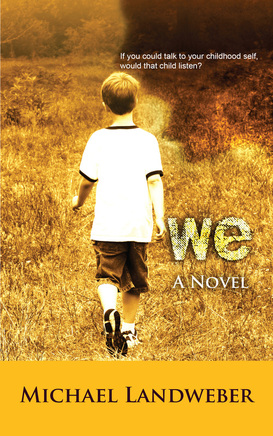Reviewed by BJ Fischer

Michael Landweber’s first novel, We, defines itself from its earliest pages with a bold narrative choice. The novel is the story of Ben Arnold, a 40-year old man who falls and loses consciousness; when he comes to, he finds himself inhabiting the brain of his own 7-year old self (known then as Binky).
At this point, I have to interrupt and admit that I have long had a bias against device-driven fiction. I don’t know whether it is a PTSD flashback from reading Robbe-Grillet in college or what, but my feeling is that too often these books end up being about the device (Watch this, Mom! No Plot!) while the story and characters are relegated to the background and suffer in the process.
And in my view, the story is the first responsibility of fiction.
From that viewpoint (and to my delighted surprise), We works and works well, starting with a masterful exposition. We learn in a few paragraphs about a family trauma that we suspect is at the root of the adult Ben’s struggles: an attack on his sister, a suicide, a broken family.
At this point, I have to interrupt and admit that I have long had a bias against device-driven fiction. I don’t know whether it is a PTSD flashback from reading Robbe-Grillet in college or what, but my feeling is that too often these books end up being about the device (Watch this, Mom! No Plot!) while the story and characters are relegated to the background and suffer in the process.
And in my view, the story is the first responsibility of fiction.
From that viewpoint (and to my delighted surprise), We works and works well, starting with a masterful exposition. We learn in a few paragraphs about a family trauma that we suspect is at the root of the adult Ben’s struggles: an attack on his sister, a suicide, a broken family.
| Ben has lived for years with the cruelest and most pernicious kind of regret a person can experience, which is regretting something we didn’t do. It is of no comfort that Binky was only seven years old when the attack occurred, or that no one of any age was able to see what was going to happen. This is a time in a life where there is only before and after. When Ben begins his ride inside Binky’s brain, we learn that it is now only a few days before the attack. This time, though, Ben knows what’s about to happen. From there, we are carried smoothly along a narrative that seeks to answer this question: can Ben convince Binky to stop the attack before it happens? Can he remove the after and restore the before? | Michael Landweber, Author of 'We' |
We feel Ben’s powerful motivation. Regret is about loss, and Landweber creates a powerful, primal picture of the family’s strength and its fissures. We see that Binky’s sister is his best friend in the family – their parents are focused on other things. Yet, families are nothing if not enigmas; here is how Landweber reminds us of the power of holding your Mother’s hand:
In her grasp, my fingers warmed from within as if my knuckles were tiny glowing coals. I wanted to walk with her, but I could not move.
The lifetime of regret has taken a toll on Ben. Ben experiences anxiety and panic “episodes” which are so strong that he has a highly-structured, therapist-designed routine to fight them off. (The book’s opening line: “The panic came on quickly, just as it always does.”) If you have ever experienced a panic attack, you will find that his description of what it feels like is uncomfortably close to reality.
I tried to pinpoint where the fear held me. But it was elusive. I knew it was there. It had to be. The hyperventilation. The pounding heart. The wooziness.
This isn’t done gratuitously – the reader needs to understand the suffering in order to understand the urgency of Ben’s mission to rewrite his past. Once we understand, we are rooting for Ben/Binky, and from there the story carries us along pretty effortlessly and, in my view, in an entertaining fashion.
The only parts of the book that did not really work were the parts where Ben battles the Freudian monsters inside Binky’s brain (id, ego, superego), fashioned as the violent and energetic forces that they are. While it was important to the story that we see the battle taking place inside Binky, these sections took the story to a new and unnecessarily abstract level and distracted from the power of the overall narrative and did so with an archaic metaphor.
On balance, though, We is an engaging book that provides the reader with all the elements of a great story. Wishing to go back in time is a human universal and the idea has found its way into plenty of literature. In We, Michael Landweber makes it work because the story is built around a character we care about who is on a mission that we care about. The tableau of family pain and suffering is rich – reminiscent of Anne Tyler. The book is a quality read and a success.
The only parts of the book that did not really work were the parts where Ben battles the Freudian monsters inside Binky’s brain (id, ego, superego), fashioned as the violent and energetic forces that they are. While it was important to the story that we see the battle taking place inside Binky, these sections took the story to a new and unnecessarily abstract level and distracted from the power of the overall narrative and did so with an archaic metaphor.
On balance, though, We is an engaging book that provides the reader with all the elements of a great story. Wishing to go back in time is a human universal and the idea has found its way into plenty of literature. In We, Michael Landweber makes it work because the story is built around a character we care about who is on a mission that we care about. The tableau of family pain and suffering is rich – reminiscent of Anne Tyler. The book is a quality read and a success.

BJ Fischer's short story "The Terrible Day of the Wisecrack" was published in February in the Linden Avenue Literary Journal, and was followed by "The True Story of Valley Forge Fries" in the Blue Lake Review. His essays have appeared in The Fiddleback, The (Toledo) Blade, the Bygone Bureau, Punchnel's, Thought Catalog, Impose Magazine, the Minneapolis Review of Baseball, Midmajority.com, and Ontologica.
You can follow BJ Fischer on Twitter: @fischerbj
or on Tumblr: bjfischer.tumblr.com.
You can follow BJ Fischer on Twitter: @fischerbj
or on Tumblr: bjfischer.tumblr.com.



 RSS Feed
RSS Feed

